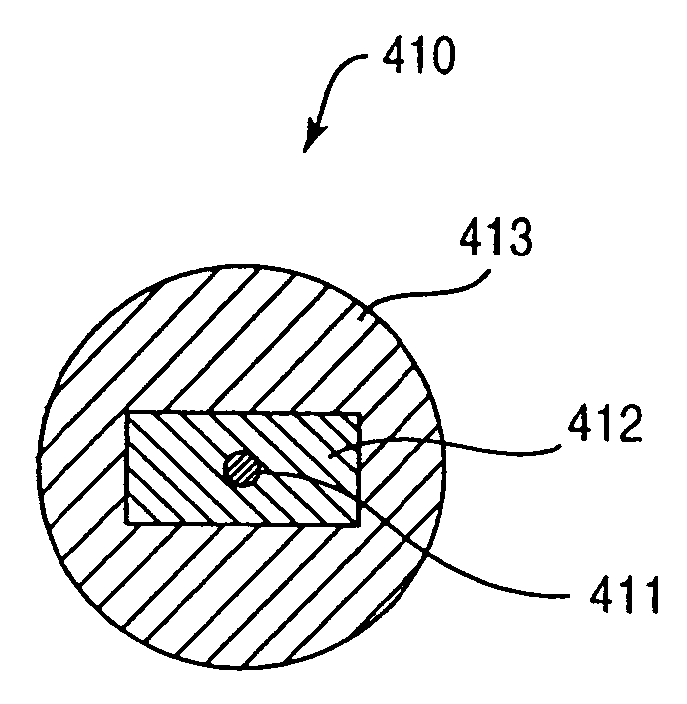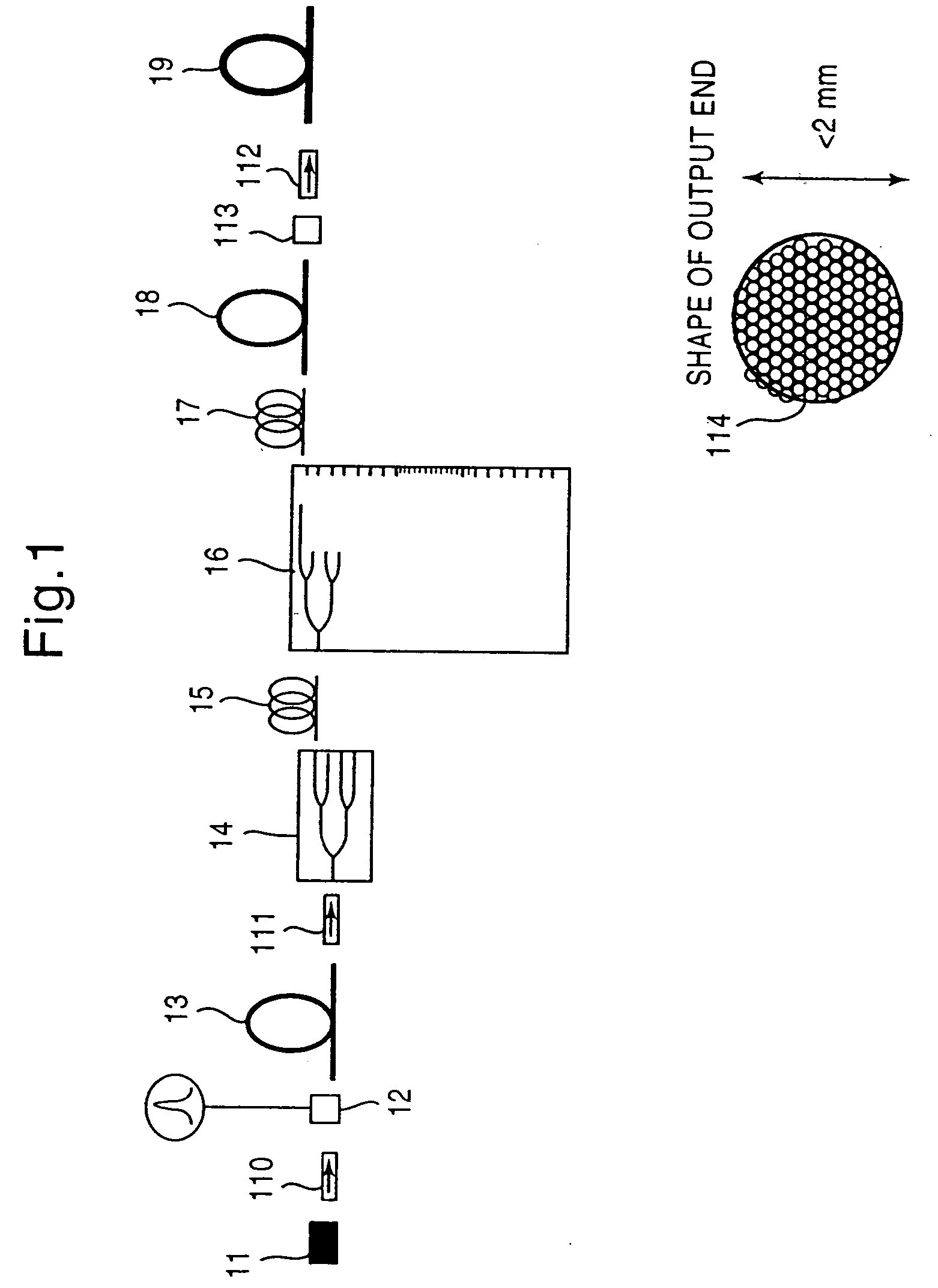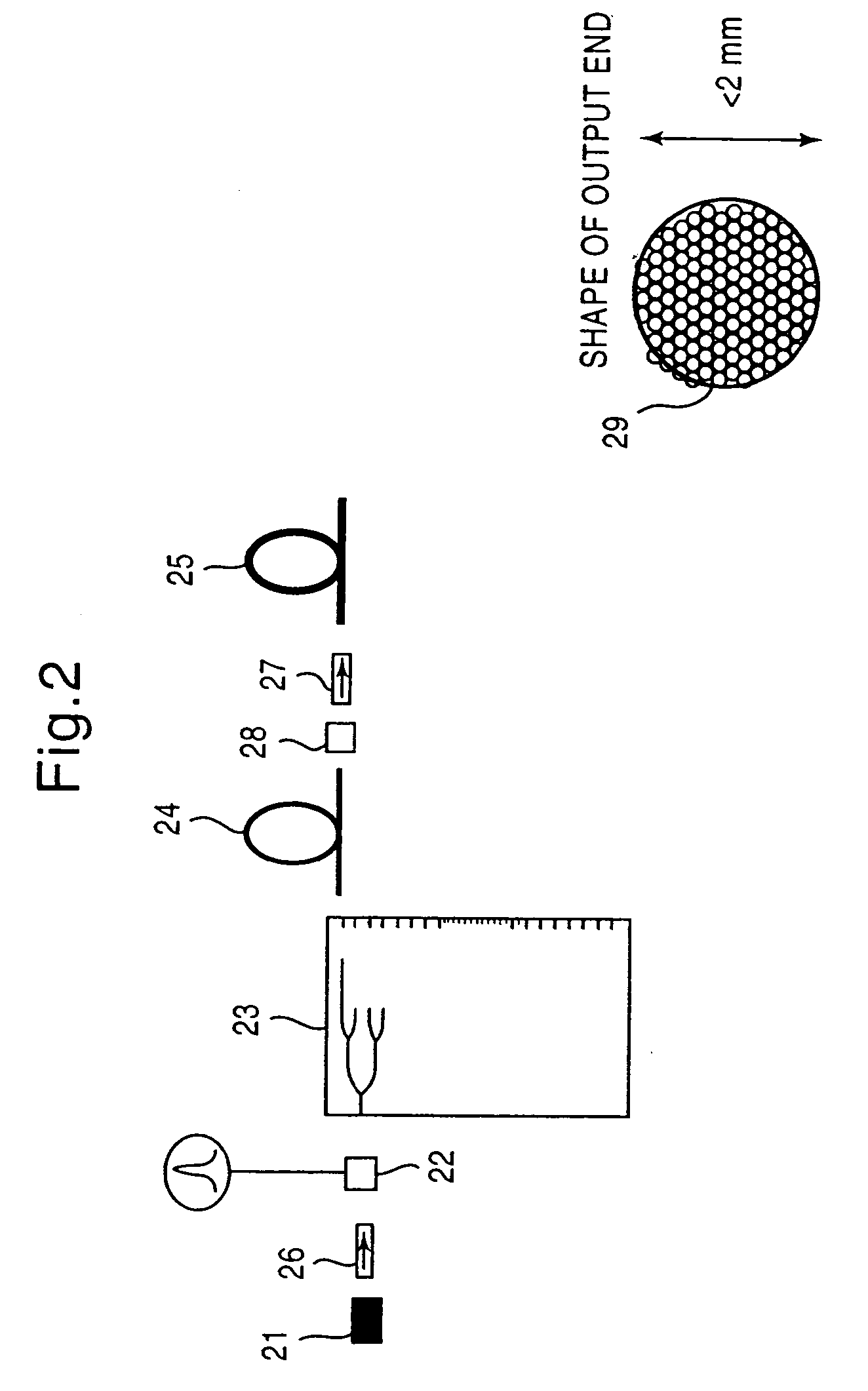Ultraviolet laser apparatus and exposure apparatus using same
a laser and ultraviolet light technology, applied in the field of laser equipment, can solve the problems of difficult to correct chromatic aberration, limited application patterns, limited material used for forming lenses of exposure equipment, etc., and achieves the effects of low spatial coherence, easy maintenance, and high degree of freedom in the arrangement of parts
- Summary
- Abstract
- Description
- Claims
- Application Information
AI Technical Summary
Benefits of technology
Problems solved by technology
Method used
Image
Examples
first embodiment
[0067] Now, the first embodiment will be fully explained. As the single wavelength oscillating laser 11 for generating the laser beam having a single wavelength, for example, InGaAsP, DFB semiconductor laser having an oscillating wavelength of 1.544 μm and continuous wave output (referred to as “CW output” hereinafter) of 20 mW. The DFB semiconductor laser is designed so that, in place of a Fabry-Perot resonator having low longitudinal mode selection, diffraction gratings are incorporated into a semiconductor laser to perform single longitudinal mode oscillation under any conditions and is called as a distributed feedback (DFB) laser. In such a laser, since single longitudinal mode oscillation is effected fundamentally, a line width of an oscillation spectrum can be suppressed below 0.01 pm.
[0068] Further, in order to fix the output wavelength of the ultraviolet laser apparatus to a given wavelength, it is preferable to provide an oscillating wavelength controlling device for contro...
second embodiment
[0089] Now, the second embodiment will be fully described. As the single wavelength oscillating laser 21 for generating the laser beam having a single wavelength, for example, an ytterbium (Yb) doped fiber laser or a DFB semiconductor laser having an oscillating wavelength of 1.099 μm and CW output of 20 mW is used. In such lasers, since single longitudinal mode oscillation is effected fundamentally, a line width of an oscillation spectrum can be suppressed to less than 0.01 pm.
[0090] The light output (CW light) of this semiconductor laser is converted into pulse light, for example, by using a light modulating element 22 such as an electro-optical light modulating element or an acousto-optical light modulating element. In the illustrated embodiment, as an example, a case where the output is modulated to pulse light having pulse width of 1 ns and repetition frequency of 12.8 MHz (pulse period of 78 μs) will be explained. As a result of such light modulation, a peak power of the pulse...
third embodiment
[0124] Now, the third embodiment will be fully explained. As the single wavelength oscillating laser 31 (FIG. 3) for generating the laser beam having a single wavelength, for example, InGaAsP, DFB semiconductor laser having an oscillating wavelength of 1.544 μm and CW output of 30 mW is used. In this laser, since single longitudinal mode oscillation is effected fundamentally, an oscillation spectrum line width can be suppressed below 0.01 pm.
[0125] The light output (continuous light) of the semiconductor laser 31 is converted into pulse light, for example, by using a light modulating element 32 such as an electro-optical light modulating element or an acousto-optical light modulating element. In the illustrated embodiment, as an example, a case where the output is modulated to pulse light having pulse width of 1 ns and repetition frequency of 100 kHz will be explained. As a result of such light modulation, peak power of the pulse light outputted from the light modulating element 32 ...
PUM
| Property | Measurement | Unit |
|---|---|---|
| single wavelength | aaaaa | aaaaa |
| wavelength | aaaaa | aaaaa |
| wavelength | aaaaa | aaaaa |
Abstract
Description
Claims
Application Information
 Login to View More
Login to View More - R&D
- Intellectual Property
- Life Sciences
- Materials
- Tech Scout
- Unparalleled Data Quality
- Higher Quality Content
- 60% Fewer Hallucinations
Browse by: Latest US Patents, China's latest patents, Technical Efficacy Thesaurus, Application Domain, Technology Topic, Popular Technical Reports.
© 2025 PatSnap. All rights reserved.Legal|Privacy policy|Modern Slavery Act Transparency Statement|Sitemap|About US| Contact US: help@patsnap.com



